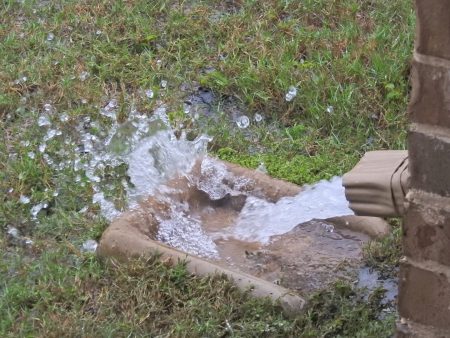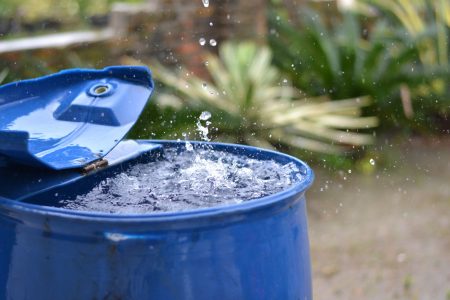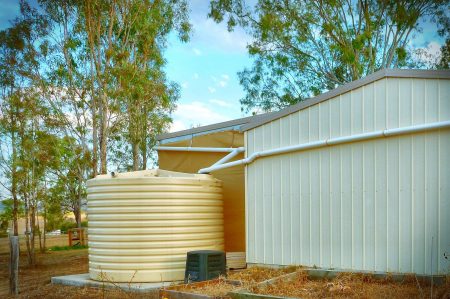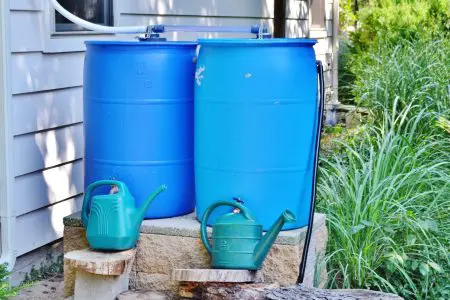Can You Drink Rainwater?
Have you ever wondered if it's okay to drink rainwater? At first glance, it would seem like there should bee no problem drinking rainwater, but then you start to think about air pollution, the stains left on your car after it rains and all of the different things that rain touches before it ever gets to a point to where you could drink it and it starts to not be so clear! So can you drink rainwater?
Rainwater is almost always safe to drink. In fact, it's normally cleaner and contains fewer chemicals and other things than water that you'd get from the tap at your house. Just remember rainwater is only as clean as the container that you're collecting it in.
There are a few things that you should know before drinking rainwater, so let's look at them a little closer.
[wc_toggle title="Table of Contents" padding="" border_width="" class="" layout="box"]
[/wc_toggle]
[wc_box color="inverse" text_align="left" margin_top="" margin_bottom="" class=""]
Thanks for supporting Ready Lifestyle! We participate in the Amazon associates program and other affiliate programs. We earn a small commission on qualifying orders at no expense to you.
Is it Okay to Drink Rainwater?
Normally, it's okay to drink rainwater, especially in a survival situation where other sources of water aren't available or are obviously contaminated. The problem is that the answer isn't always as cut and dry as that.
There are a lot of variables to consider when collecting rainwater for drinking. The type of pollutants in the air, what the rain has come into contact with after it hit the ground and the container that's holding the rainwater can all change whether it's okay to drink it or not.
Is rainwater pure?
Rainwater starts out mostly pure but it quickly picks up some of the pollution that's in the air as it falls through the sky. Then, it may come in contact with things like your roof before it finally settles into whatever container that you're collecting it in.
Each step in this process can contaminate the water and make it unsafe to drink.
Believe it or not, the amount of pollution that rainwater collects as it's falling through the air is pretty limited! This can obviously change depending on where you live and the types of pollution creating factors in your area.
Factors that increase air pollution:
- Chemical Plants
- Certain Types of Factories
- Heavy Vehicle Traffic
After the rainwater hits your roof (or the ground) it then can be contaminated by the materials your roof is made of, pollutants from the air that have settled on the roof, and things like animal feces.
Finally, the container that you're collecting the rainwater in can contaminate the water if it's not clean.
What can be in the water?
A study done in New Zeland found that there is a bunch of things that can in rainwater that can make it less than ideal for drinking. Salmonella, Giardia, Cryptosporidium and E. coli are all found on roofs and can contaminate the water.
There's also a risk of chemicals getting into the water but they were found to be low and would only have an effect after someone drank rainwater collected from a roof for years on end. The main risk is from a potential disease.
[wc_box color="primary" text_align="left" margin_top="" margin_bottom="" class=""]
Galvanized steel is the best roof type for rainwater collection, but asphalt shingles, other types of metal, and clay tiles are all fine. Try to avoid treated wood shingles if possible.
[/wc_box]
Preparing Rainwater for Drinking
There are a few ways that you can reduce the chance of diseases and pollution getting into your water before you drink it.
Installing first flush diverter (like this one) is a good idea if you're going to be collecting rainwater for any reason. It's just a simple device that takes the initial water runoff and keeps it from getting into your tank. It basically lets the initial rainwater wash some of the contamination off the roof before it gets to your storage tank. This reduced the amount of contamination by up to 5x in some tests!
The next step you should take is to run the rainwater through some kind of filter before you drink it. Any of these water filters will work but you should choose something that will last for a long time and be able to easily filter a lot of water at once. I personally have a Big Berky water filter for that purpose.
[wc_box color="primary" text_align="left" margin_top="" margin_bottom="" class=""]
The best way to treat rainwater for drinking or cooking with it is to run it through a filter that removes any microorganisms and chemicals.
[/wc_box]
You could also boil all of your water before you drink it or use it for cooking. (This makes a lot of sense for people that have a wood heater to heat their homes.) Boiling will get rid of any of the disease-causing microorganisms but most of the chemicals in the water will stay behind if you don't use some kind of filter.
Adding 8 drops of household bleach to 1 gallon of rainwater water will also kill off any disease-causing microorganisms. Just give it 30 minutes to work before you drink it. If the water is cloudy, then double the amount of bleach to 16 drops.
Harvesting Rainwater May be Illegal Where You Live
Most states in the U.S. allow you to collect rainwater, and many even encourage it because it can reduce the strain on city and state-run water treatment plants. Others only allow it under certain circumstances and some even highly regulate who can collect rainwater.
This list is just here as a quick reference. I highly suggest that you look into the laws in your area for yourself before you set up any kind of rain collection system.
Rainwater Collection Laws by State
Alabama
Rainwater harvesting is unrestricted.
Alaska
Rainwater harvesting is unrestricted.
Arizona
Rainwater harvesting is unrestricted.
Arkansas
Rainwater harvesting is allowed but it has some restrictions.
California
Rainwater harvesting is allowed but it has some restrictions.
Colorado
Rainwater harvesting is allowed but it has some restrictions.
Connecticut
Rainwater harvesting is unrestricted.
Delaware
Rainwater harvesting is unrestricted.
Florida
Rainwater harvesting is unrestricted.
Georgia
Rainwater harvesting is allowed but it has some restrictions.
Hawaii
Rainwater harvesting is unrestricted.
Idaho
Rainwater harvesting is allowed but it has some restrictions.
Illinois
Rainwater harvesting is regulated.
Indiana
Rainwater harvesting is unrestricted.
Iowa
Rainwater harvesting is unrestricted.
Kansas
Rainwater harvesting is unrestricted.
Kentucky
Rainwater harvesting is unrestricted.
Louisiana
Rainwater harvesting is allowed but it has some restrictions.
Maine
Rainwater harvesting is unrestricted.
Maryland
Rainwater harvesting is unrestricted.
Massachusetts
Rainwater harvesting is unrestricted.
Michigan
Rainwater harvesting is unrestricted.
Minnesota
Rainwater harvesting is unrestricted.
Mississippi
Rainwater harvesting is unrestricted.
Missouri
Rainwater harvesting is unrestricted.
Montana
Rainwater harvesting is unrestricted.
Nebraska
Rainwater harvesting is unrestricted.
Nevada
Rainwater harvesting is regulated.
New Hampshire
Rainwater harvesting is unrestricted.
New Jersey
Rainwater harvesting is unrestricted.
New Mexico
Rainwater harvesting is unrestricted.
New York
Rainwater harvesting is unrestricted.
North Carolina
Rainwater harvesting is allowed but it has some restrictions.
North Dakota
Rainwater harvesting is unrestricted.
Ohio
Rainwater harvesting is allowed but it has some restrictions.
Oklahoma
Rainwater harvesting is unrestricted.
Oregon
Rainwater harvesting is allowed but it has some restrictions.
Pennsylvania
Rainwater harvesting is unrestricted.
Rhode Island
Rainwater harvesting is unrestricted.
South Carolina
Rainwater harvesting is unrestricted.
South Dakota
Rainwater harvesting is unrestricted.
Tennessee
Rainwater harvesting is unrestricted.
Texas
Rainwater harvesting is allowed but it has some restrictions.
Utah
Rainwater harvesting is regulated.
Vermont
Rainwater harvesting is unrestricted.
Virginia
Rainwater harvesting is unrestricted.
Washington
Rainwater harvesting is unrestricted.
West Virginia
Rainwater harvesting is unrestricted.
Wisconsin
Rainwater harvesting is unrestricted.
Wyoming
Rainwater harvesting is unrestricted.
Why is rainwater harvesting illegal?
It probably seems crazy to some people that rainwater collection is illegal in some areas. I would honestly agree, but that doesn't change the fact that there are some areas where collecting rainwater can get you in trouble.
Most of the laws around rainwater collection seem to come from laws that regulate the use of water on private property and water rights. They're designed to prevent people from using water in a way that will negatively affect the environment.
That still doesn't explain how certain states see rainwater collection as a huge plus and others almost completely limit it.
Best Ways to Use Rainwater
Rainwater is certainly able to be used as drinking water as long as you filter it sufficiently, but that's not really the best way to use it! When you don't use rainwater for drinking or cooking, you usually don't need to filter it or do anything special to make it useable.
Most people that collect rainwater, don't actually drink it. The most common use is for watering and irrigating gardens. This saves on the amount of water that they need to use from outside sources and it's why most states allow you to collect rainwater.
Showering is another great use for rainwater. If there's ever a time when water is in short supply or you decide to live off-grid, you can shower with rainwater. Again, this is probably a better use than drinking because you don't need to treat the water as long as it's relatively clean.
Rainwater is also good for washing clothes. I would stay away from washing whites and any light colors because rainwater tends to be slightly off-color depending on how you store it.
The last way is something that a lot of people probably don't think about at all! You can use it to flush toilets. Even if everything starts going south and the world falls apart, you can still fill up the back of your toilet to flush it.
Conclusion
Rainwater can be used for drinking as long as you take some measures to kill off the diseases that it could contain. Filtering is the best way, but it also takes more time than other methods.
You also need to make sure that rainwater collection is legal where you live. It sounds kind of crazy but it may be illegal in your state.
Can You Drink Rainwater – How to Collect Free Drinking Water is republished from: Ready Lifestyle




Comments
Post a Comment